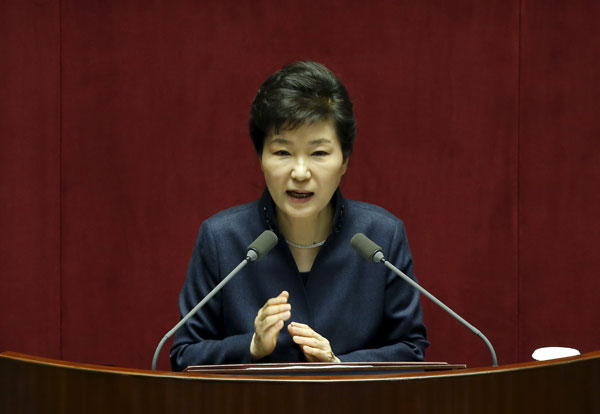 |
|
South Korean President Park Geun-hye delivers her speech during a plenary session at the National Assembly in Seoul, South Korea, February 16, 2016.[Photo/Agencies] |
Park said in a nationally televised parliamentary speech that those measures will make the Democratic People's Republic of Korea (DPRK) realize a fact that the country cannot survive with nuclear development.
Her parliamentary speech was arranged to explain Seoul's decision last week to shut down an inter-Korean factory park in the DPRK's border city of Kaesong as part of its punitive actions to Pyongyang's nuclear test and long-range rocket launch.
The DPRK launched a rocket on Feb. 7 to carry an Earth observation satellite into orbit, following its fourth nuclear test on Jan. 6, the first of its disputed H-bomb test. Seoul and the international community condemned those provocations as a clear violation of UN Security Council resolutions.
In response to the rocket launch, the ROK decided last Wednesday to stop operations at the Kaesong Industrial Zone, which Seoul saw as a key source of hard currency for Pyongyang to develop nuclear and missile programs.
The DPRK responded a day later by shutting down the last symbol of inter-Korean cooperation project, expelling the ROK's workers from there and freezing all of the ROK's assets in Kaesong, while cutting off the remaining inter-Korean communications hotlines.
Park said that the complete shutdown of the Kaesong complex represents only the start of a series of sanctions toward the DPRK in cooperation with the international society.
It will not happen again like in the past that the ROK yields to DPRK provocations and provide unconditional aid to it, Park noted.
Seoul, Washington and Tokyo are pushing hard to impose tougher new sanctions toward Pyongyang at the UN Security Council, separately from efforts to adopt other bilateral and multilateral restrictions for the recent nuclear and rocket tests.
According to Seoul's unification ministry, about 616 billion won (560 million US.dollars) has been funneled into the DPRK government since the factory park started manufacturing products in December 2004.
Some 70 percent of the funds have been channeled into the DPRK's nuclear and missile developments and the purchase of luxury goods, the ministry estimated without elaborating on how the 70 percent was calculated.
Companies from the ROK?had paid wages for DPRK workers in Kaesong in US dollars to the DPRK government, which in turn had paid them wages in the DPRK currency or store vouchers, according to the Unification Ministry.
Park said foreign currency inflow into the DPRK should be blocked to prevent the country from advancing its nuclear and missile capability.
Touching on talks between Seoul and Washington on deploying a sophisticated US missile defense system in South Korea, Park said that negotiations on the Terminal High-Altitude Area Defense (THAAD) deployment were part of measures to strengthen combined ROK-US capability to deter the DPRK's missile threats.
During the upcoming negotiations on the THAAD deployment, Park said, her country will strengthen cooperation with the United States and Japan, while laying stress on consulting with China and Russia.
The THAAD, designed to track and destroy ballistic missiles at an altitude of 40-150 km, has been put under suspicion about its operational effectiveness in the ROK as hundreds of shorter-range DPRK missiles can fly at a much lower altitude.
Controversy remained over safety as the THAAD's X-band radar emits super-strong microwaves being harmful to human bodies within 3.6 km and paralyzing electronic devices and airplanes within 5.5 km.
Seemingly mindful of domestic oppositions to the THAAD deployment, Park said that "aiming the tip of a sword back to us and dividing ourselves are something that should not happen," calling for a national unity to tackle security issues.